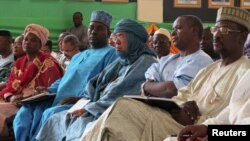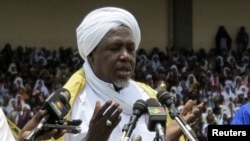BAMAKO — Mali's High Islamic Council has opened talks with the al-Qaida-linked Islamist militants who control the northern half of the country and are trying to impose a harsh interpretation of Sharia law.
The president of Mali's High Islamic Council, Imam Mahamoud Dicko, is one of several national and regional leaders making attempts at mediation with armed groups in the North.
Dicko believes a peaceful solution to the crisis is still possible and as a highly conservative and respected imam with borderline Wahabist tendencies, he could be well-placed to make inroads.
In a VOA interview, Dicko said that talks are moving forward "slowly but surely."
The militants, he said, have not closed the door to negotiations, adding that they are available. However, to what degree or to what end, he said he does not yet know.
Islamist militants have set up tribunals to rule on economic quarrels like land use or inheritance, as well as issues like theft and drunkenness. Their hardline interpretation of Islamic law has so far led to the stoning to death of an unmarried couple, the amputation of limbs and a ban on non-Islamic music, which Dicko calls excessive.
Dicko said you can never impose a way of life on people by force, especially when it comes to faith and spirituality. He said this is the message he has already given and will continue to give to militant leaders. He said he is optimistic that they will understand. But he said everyone must move quickly, because the situation cannot remain this way indefinitely.
Dicko has so far visited the northern town of Gao, where he met with the head of the relatively new al-Qaida offshoot that controls that town, the Movement for Oneness and Jihad in West Africa, or MUJAO.
Dicko said he has also been speaking by phone with Iyad ag Ghaly, the Malian Tuareg leader who founded the extremist group, Ansar Dine, which translates in English as "Defenders of the Faith." The group has close ties to al-Qaida in the Islamic Maghreb. Dicko said the two men are arranging a face-to-face meeting.
He also said talks with militant leaders are grounded in Islam and are meant to be a complement to negotiation efforts by the Malian government and regional leaders.
He said the ultimate goal is to travel to northern Mali with a strong delegation of the nation's pre-eminent Muslim legal scholars, known as ulemas, to meet with the militants.
Dicko said these fighters are a minority within Mali's Muslim community, but they are still part of their community and that is how they will approach them. He said the delegation will communicate the conclusions of its study of the situation and its interpretation of Sharia law. He said the militants must conform to the wishes of the larger community to spare the nation from further unpleasantness. He said it will be a strong message and one he hopes they will have the wisdom to accept.
Dicko said the preservation of Mali's territorial integrity is paramount, but he wouldn't say whether Mali would explore a compromise like Nigeria, where certain northern states have opted to impose their brand of Islamic law.
The situation in northern Mali has looked increasingly grim since April, when Islamist militant groups took advantage of a Tuareg separatist rebellion and a March 22 military coup in Bamako to seize control of two-thirds of Mali's national territory.
Hundreds of thousands have fled the north, and the transitional government is still searching for solid footing in the midst of a post-coup political upheaval. The weakness of the central government in Bamako has been a handicap to negotiation efforts.
Dicko said the nation's leaders must put aside their differences and petty quarrels and calculations. He said there has been enough of this tug-of-war for power, and they must now come together to reunify the country.
International leaders say they will not allow northern Mali to go the way of terrorist safe havens like Afghanistan.
The West African regional bloc ECOWAS wants to send in troops to support the Malian army, still in disarray following the coup, to retake the north. The United States and France have indicated that they could provide valuable logistical support to such an effort.
War, Dicko said, should be a last resort because it benefits no one. It is the worst solution, he said, one that he doesn't think is in the militants' interest either. He said his message to them has been that they may be able to win a war against Mali, but they cannot win one against the international community.
The president of Mali's High Islamic Council, Imam Mahamoud Dicko, is one of several national and regional leaders making attempts at mediation with armed groups in the North.
Dicko believes a peaceful solution to the crisis is still possible and as a highly conservative and respected imam with borderline Wahabist tendencies, he could be well-placed to make inroads.
In a VOA interview, Dicko said that talks are moving forward "slowly but surely."
The militants, he said, have not closed the door to negotiations, adding that they are available. However, to what degree or to what end, he said he does not yet know.
Islamist militants have set up tribunals to rule on economic quarrels like land use or inheritance, as well as issues like theft and drunkenness. Their hardline interpretation of Islamic law has so far led to the stoning to death of an unmarried couple, the amputation of limbs and a ban on non-Islamic music, which Dicko calls excessive.
Dicko said you can never impose a way of life on people by force, especially when it comes to faith and spirituality. He said this is the message he has already given and will continue to give to militant leaders. He said he is optimistic that they will understand. But he said everyone must move quickly, because the situation cannot remain this way indefinitely.
Dicko has so far visited the northern town of Gao, where he met with the head of the relatively new al-Qaida offshoot that controls that town, the Movement for Oneness and Jihad in West Africa, or MUJAO.
Dicko said he has also been speaking by phone with Iyad ag Ghaly, the Malian Tuareg leader who founded the extremist group, Ansar Dine, which translates in English as "Defenders of the Faith." The group has close ties to al-Qaida in the Islamic Maghreb. Dicko said the two men are arranging a face-to-face meeting.
He also said talks with militant leaders are grounded in Islam and are meant to be a complement to negotiation efforts by the Malian government and regional leaders.
He said the ultimate goal is to travel to northern Mali with a strong delegation of the nation's pre-eminent Muslim legal scholars, known as ulemas, to meet with the militants.
Dicko said these fighters are a minority within Mali's Muslim community, but they are still part of their community and that is how they will approach them. He said the delegation will communicate the conclusions of its study of the situation and its interpretation of Sharia law. He said the militants must conform to the wishes of the larger community to spare the nation from further unpleasantness. He said it will be a strong message and one he hopes they will have the wisdom to accept.
Dicko said the preservation of Mali's territorial integrity is paramount, but he wouldn't say whether Mali would explore a compromise like Nigeria, where certain northern states have opted to impose their brand of Islamic law.
The situation in northern Mali has looked increasingly grim since April, when Islamist militant groups took advantage of a Tuareg separatist rebellion and a March 22 military coup in Bamako to seize control of two-thirds of Mali's national territory.
Hundreds of thousands have fled the north, and the transitional government is still searching for solid footing in the midst of a post-coup political upheaval. The weakness of the central government in Bamako has been a handicap to negotiation efforts.
Dicko said the nation's leaders must put aside their differences and petty quarrels and calculations. He said there has been enough of this tug-of-war for power, and they must now come together to reunify the country.
International leaders say they will not allow northern Mali to go the way of terrorist safe havens like Afghanistan.
The West African regional bloc ECOWAS wants to send in troops to support the Malian army, still in disarray following the coup, to retake the north. The United States and France have indicated that they could provide valuable logistical support to such an effort.
War, Dicko said, should be a last resort because it benefits no one. It is the worst solution, he said, one that he doesn't think is in the militants' interest either. He said his message to them has been that they may be able to win a war against Mali, but they cannot win one against the international community.





